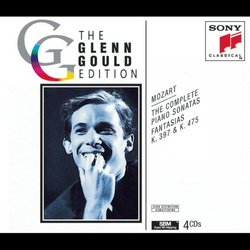| All Artists: Wolfgang Amadeus Mozart, Glenn Gould Title: Mozart: The Complete Piano Sonatas; Fantasias, K397 & K475 Members Wishing: 0 Total Copies: 0 Label: Sony Release Date: 2/7/1995 Genre: Classical Styles: Forms & Genres, Fantasies, Sonatas, Historical Periods, Classical (c.1770-1830), Modern, 20th, & 21st Century Number of Discs: 4 SwapaCD Credits: 4 UPC: 074645262727 |
Search - Wolfgang Amadeus Mozart, Glenn Gould :: Mozart: The Complete Piano Sonatas; Fantasias, K397 & K475
 | Wolfgang Amadeus Mozart, Glenn Gould Mozart: The Complete Piano Sonatas; Fantasias, K397 & K475 Genre: Classical
|
Larger Image |
CD DetailsSimilarly Requested CDs
|
CD ReviewsVery Strong L. Berk | Praha, CR | 03/24/2004 (4 out of 5 stars) "I came across Glenn Gould's rendition of Mozart's Piano Sonatas from a friend of mine, and have been quite happy with it. This four-CD collection is both a shining example of Gould's ability to play piano, and also an excellent introduction to Mozart's piano sonatas. It must, however, be taken into account that Gould puts his own spin on the sonatas. Rather than sticking precisely to Mozart's penned music, Gould adds his own quirks and habits to his playing. The result? No one really sits the fence. For many listeners, this is a superb, nouveau way to listen to Mozart's piano sonatas. For others, though, Gould is tampering with a masterpiece. Personally, I find this to be one of Gould's strongest showings on the piano. He changes tempos in some songs, clearly interpreting Mozart's music as something of his own. I find these CDs to be an entertaining re-examination of Mozart's sonatas: They are not for everyone, but they are certainly worth a listen, if only to experience the artistry with which Gould plays. If you are new to Gould, this is really the set that started me listening to him: I recommend it, as it shows his adeptness with piano, and his abilities to "interpret" other composer's music. If you are a seasoned Gould fan, then this collection undoubtedly deserves a place in your collection. If you are a Mozart fan...Chances are, you will either love this collection, or you will hate it: It is Gould at his finest, and in this state of expertise, he arguably alters Mozart's musical "intentions." Regardless, however, this set is capitivating and Gould is remarkably talanted." Requires an open mind, but rewarding. V. Vo | Los Angeles, CA USA | 05/07/2002 (3 out of 5 stars) "The question in which I always ask the listeners who completely malign the Mozart recording of Glenn Gould is whether or not they've listened to these recordings thoroughly. Most listeners who I know dislike these recordings give up by the 2nd disk. The Glenn Gould interpretation of Mozart is not in the usual Viennese style. He omits almost every repeat indicated by the composer, and he hardly uses the pedal for effect. He plays these works as if they were highly contrapuntal in nature (even though they're not). So its not the case, in which he plays the Mozart sonatas as if he was playing Bach, but more or less of a musician who wants to explore the melodic and rhythmic design of these works. With that said, most of the recordings do not work because the works themselves are not contrapuntal in nature. Works such as the early sonatas suffer, since he omits the repeats and plays Allegro movements as Presto and Adagio movements as Allegro Prestissimo, hence making each of the sonatas last 8 minutes long. They seem more or less like the preludes of Bach. The popular sonatas such as the K332 "Turkish March" sonata, and the K333 B-flat major sonata are unlike any recording because Gould really forces the contrapuntal aspects of these works, when really there isn't enough depth to work with. One of the sonatas I love the most, the K310 a-minor sonata, is given a hatchet job treatment by Gould. The first movement Allegro is absolutely incomprehensible, and downright insane.Yet, even though I'm rating these recordings so far as a negative review, there are several gems in this set. The two greatest of the gems are extraordinary. The K284 "Durnitz" sonata, with the Theme and Variations movement, is one of the most joyous, humorous recordings I've ever heard. This recording has so many contrasting moments, and Glenn Gould brings out something extraordinary in this work... he makes the variations seem like they are melodic lines in which are trying to communicate with one another. I've recently tried to compare this recording with the versions by Uchida, Brendel, Haebler, and Barenboim and they all sound identical to each other. Glenn Gould's version is completely different, so the question of "who's right" often would be asked, but just listen to Gould's "Durnitz" sonata and see for yourself.The K457 Sonata in c-minor is one of Mozart's darkest works, and Glenn Gould's version is downright heartbreaking. The Adagio is played with an unbearable intensity. I can still remember the first time listening to this recording and how intense the situation was. He plays it extremely slow and unlike the other works, he savors the repeats. Many listeners view the Brahms Intermezzi as Gould's most emotional output. I would rank the adagio movement of the c-minor sonata in that same category.Careful listeners of piano music will find gems of their own in these recordings. It just requires an open mind." Mozart Meets Gould L. Berk | 07/02/2003 (2 out of 5 stars) "Hearing these discs again reminded me how very hit or miss Gould is as an interpreter of works of a non-baroque type. Since Gould had one of the greatest techniques of any 20th century pianist and could play with beautiful color when he wanted (the Brahms Intermezzi for example) his choice to hack down Mozart with some of his most vandalistic pianism is rather dissapointing. There are indeed some fine moments, but overall the playing does not tell us anything remarkable about Mozart, the piano or Glenn Gould. I would agree with those who believe that the sonatas do not represent Mozart at his compositional best, but in the hands of Artur Schnabel or Horowitz they at least get a chance to have their say. Gould seems determined to reveal the perceived weaknesses of the works by bringing out the uninteresting accompaniments and using tempi which show the sonatas to disadvantage. And with regard to some of the unmusical sprints through Allegro movements, I wonder why he didn't just play some Etudes by the equally despised Chopin instead, so fixated does he seem with digital dexterity. So, if you a Gould fan (as I am) steer well clear of this release. If you want to hear Gould play Mozart, I would go for the C minor concerto, for here he demonstates a passion and commitment to the music notably lacking in the sonatas."
|

 Track Listings (18) - Disc #1
Track Listings (18) - Disc #1



